Analyzing the Role of Fathers in Women's Childbirth Experience
VerifiedAdded on 2022/10/02
|5
|1181
|76
Essay
AI Summary
This essay explores the increasing importance of male involvement in childbirth, focusing on the role of fathers as partners and emotional support providers. It highlights the benefits of father's presence, such as reduced risks of mental health issues, low birth weight, and preterm birth, as well as the reduction of labor pain and caesarean deliveries. The essay emphasizes the importance of emotional support, companionship, and communication within the family. It also discusses the potential negative consequences of a lack of support, including increased stress, mental health disorders, and weakened family bonds. The essay references factors contributing to this support in Canada, such as cultural beliefs, public awareness, and socio-economic status. The conclusion reinforces the critical role of fathers in providing emotional support to their wives during childbirth and advocates for increased male involvement.
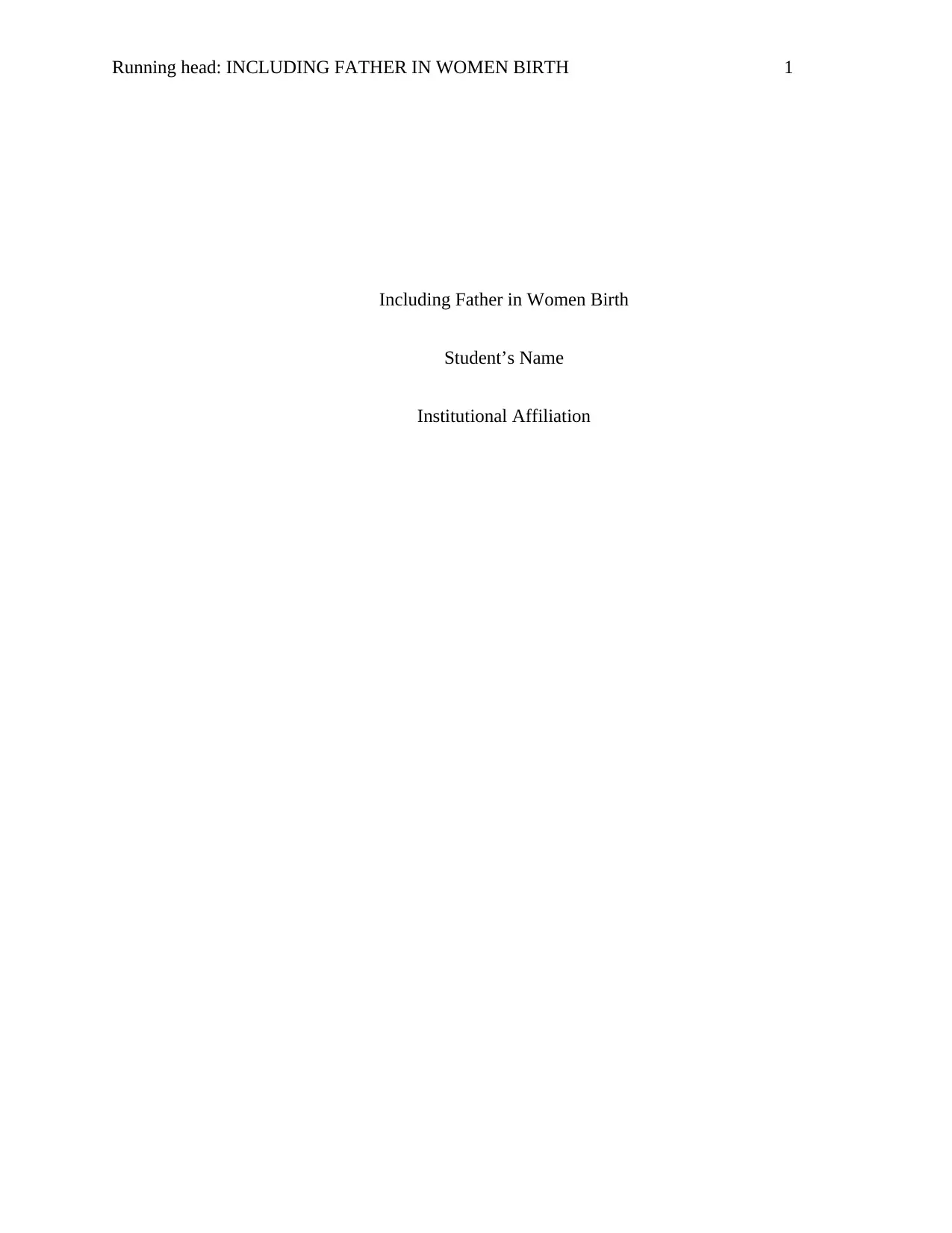
Running head: INCLUDING FATHER IN WOMEN BIRTH 1
Including Father in Women Birth
Student’s Name
Institutional Affiliation
Including Father in Women Birth
Student’s Name
Institutional Affiliation
Paraphrase This Document
Need a fresh take? Get an instant paraphrase of this document with our AI Paraphraser
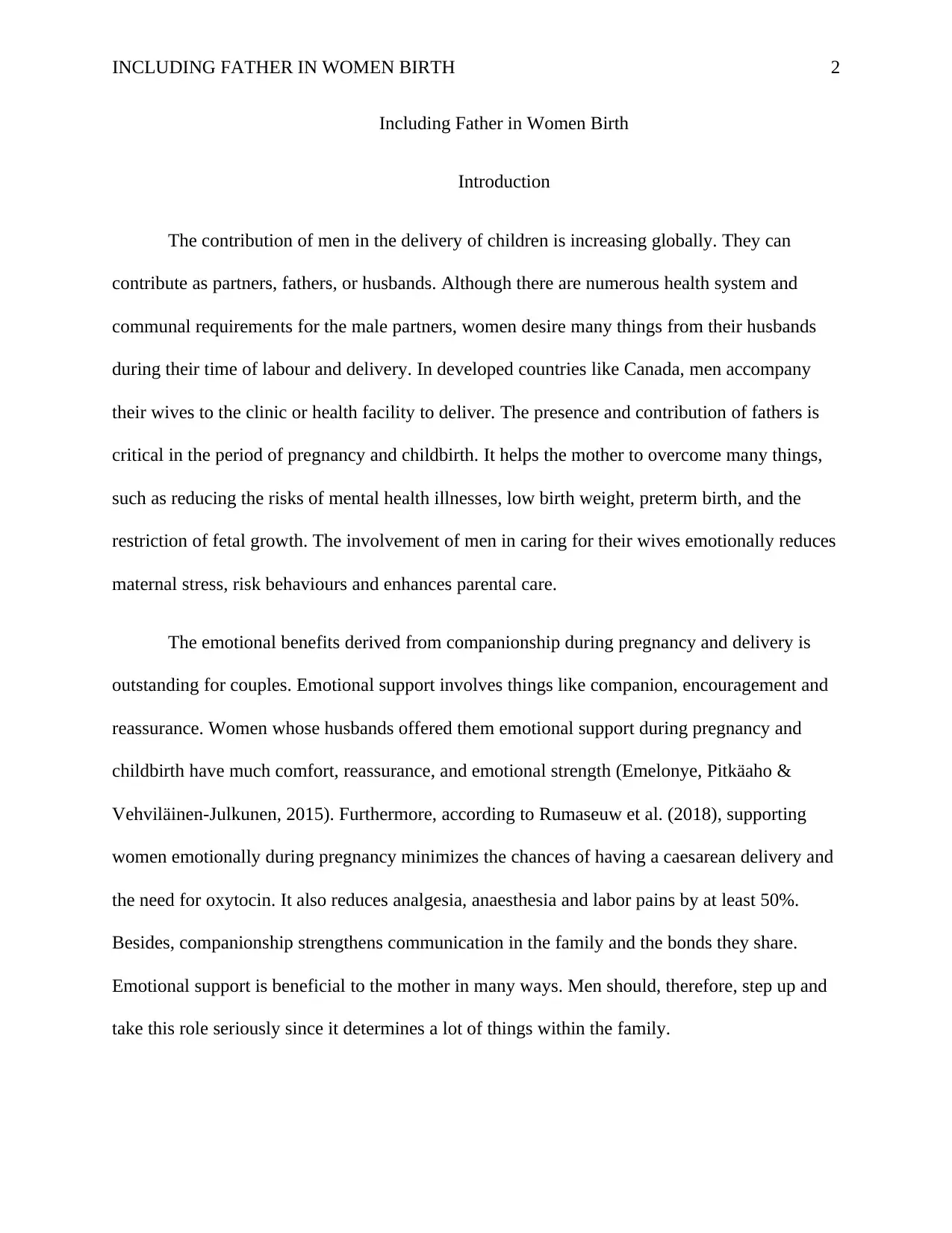
INCLUDING FATHER IN WOMEN BIRTH 2
Including Father in Women Birth
Introduction
The contribution of men in the delivery of children is increasing globally. They can
contribute as partners, fathers, or husbands. Although there are numerous health system and
communal requirements for the male partners, women desire many things from their husbands
during their time of labour and delivery. In developed countries like Canada, men accompany
their wives to the clinic or health facility to deliver. The presence and contribution of fathers is
critical in the period of pregnancy and childbirth. It helps the mother to overcome many things,
such as reducing the risks of mental health illnesses, low birth weight, preterm birth, and the
restriction of fetal growth. The involvement of men in caring for their wives emotionally reduces
maternal stress, risk behaviours and enhances parental care.
The emotional benefits derived from companionship during pregnancy and delivery is
outstanding for couples. Emotional support involves things like companion, encouragement and
reassurance. Women whose husbands offered them emotional support during pregnancy and
childbirth have much comfort, reassurance, and emotional strength (Emelonye, Pitkäaho &
Vehviläinen-Julkunen, 2015). Furthermore, according to Rumaseuw et al. (2018), supporting
women emotionally during pregnancy minimizes the chances of having a caesarean delivery and
the need for oxytocin. It also reduces analgesia, anaesthesia and labor pains by at least 50%.
Besides, companionship strengthens communication in the family and the bonds they share.
Emotional support is beneficial to the mother in many ways. Men should, therefore, step up and
take this role seriously since it determines a lot of things within the family.
Including Father in Women Birth
Introduction
The contribution of men in the delivery of children is increasing globally. They can
contribute as partners, fathers, or husbands. Although there are numerous health system and
communal requirements for the male partners, women desire many things from their husbands
during their time of labour and delivery. In developed countries like Canada, men accompany
their wives to the clinic or health facility to deliver. The presence and contribution of fathers is
critical in the period of pregnancy and childbirth. It helps the mother to overcome many things,
such as reducing the risks of mental health illnesses, low birth weight, preterm birth, and the
restriction of fetal growth. The involvement of men in caring for their wives emotionally reduces
maternal stress, risk behaviours and enhances parental care.
The emotional benefits derived from companionship during pregnancy and delivery is
outstanding for couples. Emotional support involves things like companion, encouragement and
reassurance. Women whose husbands offered them emotional support during pregnancy and
childbirth have much comfort, reassurance, and emotional strength (Emelonye, Pitkäaho &
Vehviläinen-Julkunen, 2015). Furthermore, according to Rumaseuw et al. (2018), supporting
women emotionally during pregnancy minimizes the chances of having a caesarean delivery and
the need for oxytocin. It also reduces analgesia, anaesthesia and labor pains by at least 50%.
Besides, companionship strengthens communication in the family and the bonds they share.
Emotional support is beneficial to the mother in many ways. Men should, therefore, step up and
take this role seriously since it determines a lot of things within the family.
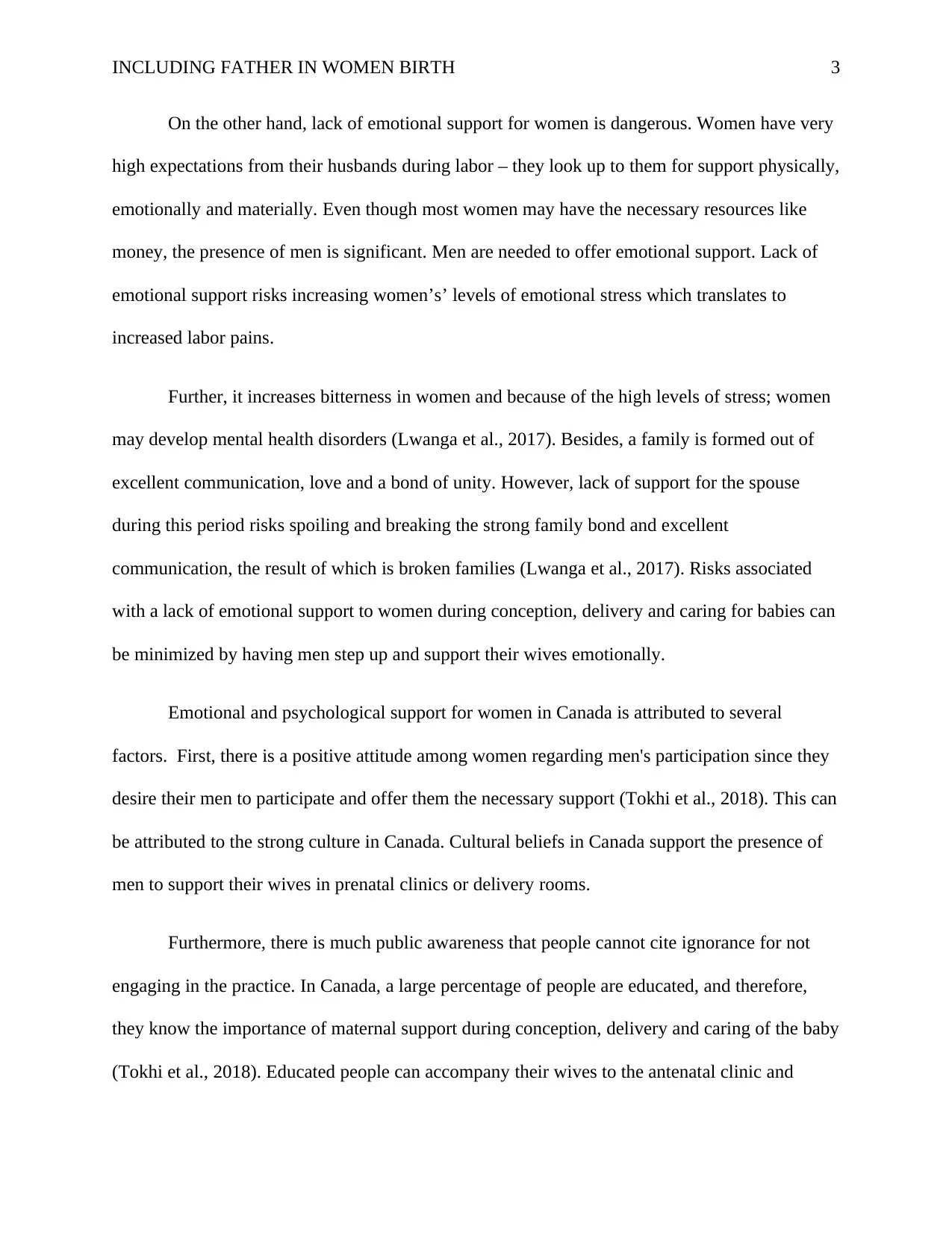
INCLUDING FATHER IN WOMEN BIRTH 3
On the other hand, lack of emotional support for women is dangerous. Women have very
high expectations from their husbands during labor – they look up to them for support physically,
emotionally and materially. Even though most women may have the necessary resources like
money, the presence of men is significant. Men are needed to offer emotional support. Lack of
emotional support risks increasing women’s’ levels of emotional stress which translates to
increased labor pains.
Further, it increases bitterness in women and because of the high levels of stress; women
may develop mental health disorders (Lwanga et al., 2017). Besides, a family is formed out of
excellent communication, love and a bond of unity. However, lack of support for the spouse
during this period risks spoiling and breaking the strong family bond and excellent
communication, the result of which is broken families (Lwanga et al., 2017). Risks associated
with a lack of emotional support to women during conception, delivery and caring for babies can
be minimized by having men step up and support their wives emotionally.
Emotional and psychological support for women in Canada is attributed to several
factors. First, there is a positive attitude among women regarding men's participation since they
desire their men to participate and offer them the necessary support (Tokhi et al., 2018). This can
be attributed to the strong culture in Canada. Cultural beliefs in Canada support the presence of
men to support their wives in prenatal clinics or delivery rooms.
Furthermore, there is much public awareness that people cannot cite ignorance for not
engaging in the practice. In Canada, a large percentage of people are educated, and therefore,
they know the importance of maternal support during conception, delivery and caring of the baby
(Tokhi et al., 2018). Educated people can accompany their wives to the antenatal clinic and
On the other hand, lack of emotional support for women is dangerous. Women have very
high expectations from their husbands during labor – they look up to them for support physically,
emotionally and materially. Even though most women may have the necessary resources like
money, the presence of men is significant. Men are needed to offer emotional support. Lack of
emotional support risks increasing women’s’ levels of emotional stress which translates to
increased labor pains.
Further, it increases bitterness in women and because of the high levels of stress; women
may develop mental health disorders (Lwanga et al., 2017). Besides, a family is formed out of
excellent communication, love and a bond of unity. However, lack of support for the spouse
during this period risks spoiling and breaking the strong family bond and excellent
communication, the result of which is broken families (Lwanga et al., 2017). Risks associated
with a lack of emotional support to women during conception, delivery and caring for babies can
be minimized by having men step up and support their wives emotionally.
Emotional and psychological support for women in Canada is attributed to several
factors. First, there is a positive attitude among women regarding men's participation since they
desire their men to participate and offer them the necessary support (Tokhi et al., 2018). This can
be attributed to the strong culture in Canada. Cultural beliefs in Canada support the presence of
men to support their wives in prenatal clinics or delivery rooms.
Furthermore, there is much public awareness that people cannot cite ignorance for not
engaging in the practice. In Canada, a large percentage of people are educated, and therefore,
they know the importance of maternal support during conception, delivery and caring of the baby
(Tokhi et al., 2018). Educated people can accompany their wives to the antenatal clinic and
⊘ This is a preview!⊘
Do you want full access?
Subscribe today to unlock all pages.

Trusted by 1+ million students worldwide
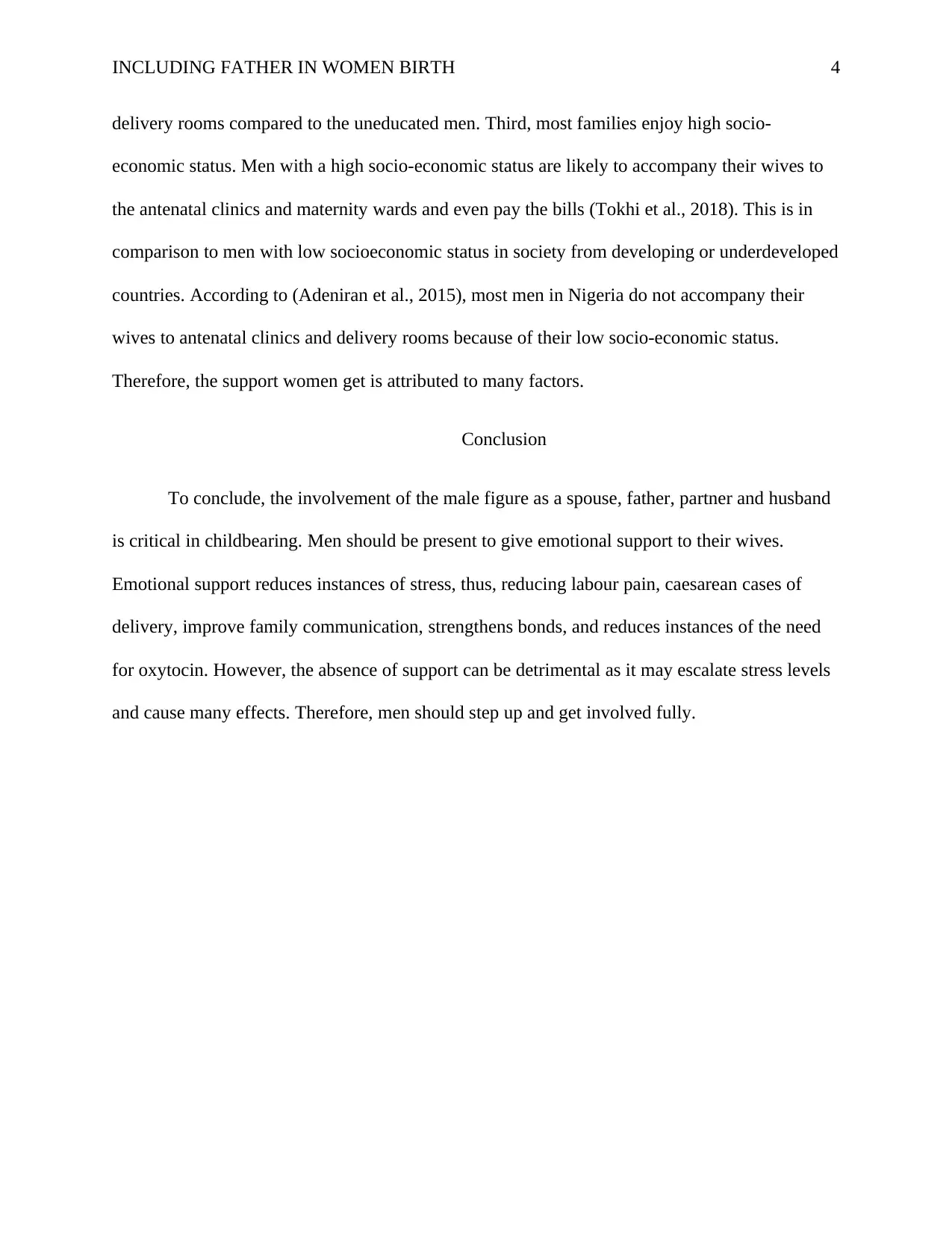
INCLUDING FATHER IN WOMEN BIRTH 4
delivery rooms compared to the uneducated men. Third, most families enjoy high socio-
economic status. Men with a high socio-economic status are likely to accompany their wives to
the antenatal clinics and maternity wards and even pay the bills (Tokhi et al., 2018). This is in
comparison to men with low socioeconomic status in society from developing or underdeveloped
countries. According to (Adeniran et al., 2015), most men in Nigeria do not accompany their
wives to antenatal clinics and delivery rooms because of their low socio-economic status.
Therefore, the support women get is attributed to many factors.
Conclusion
To conclude, the involvement of the male figure as a spouse, father, partner and husband
is critical in childbearing. Men should be present to give emotional support to their wives.
Emotional support reduces instances of stress, thus, reducing labour pain, caesarean cases of
delivery, improve family communication, strengthens bonds, and reduces instances of the need
for oxytocin. However, the absence of support can be detrimental as it may escalate stress levels
and cause many effects. Therefore, men should step up and get involved fully.
delivery rooms compared to the uneducated men. Third, most families enjoy high socio-
economic status. Men with a high socio-economic status are likely to accompany their wives to
the antenatal clinics and maternity wards and even pay the bills (Tokhi et al., 2018). This is in
comparison to men with low socioeconomic status in society from developing or underdeveloped
countries. According to (Adeniran et al., 2015), most men in Nigeria do not accompany their
wives to antenatal clinics and delivery rooms because of their low socio-economic status.
Therefore, the support women get is attributed to many factors.
Conclusion
To conclude, the involvement of the male figure as a spouse, father, partner and husband
is critical in childbearing. Men should be present to give emotional support to their wives.
Emotional support reduces instances of stress, thus, reducing labour pain, caesarean cases of
delivery, improve family communication, strengthens bonds, and reduces instances of the need
for oxytocin. However, the absence of support can be detrimental as it may escalate stress levels
and cause many effects. Therefore, men should step up and get involved fully.
Paraphrase This Document
Need a fresh take? Get an instant paraphrase of this document with our AI Paraphraser
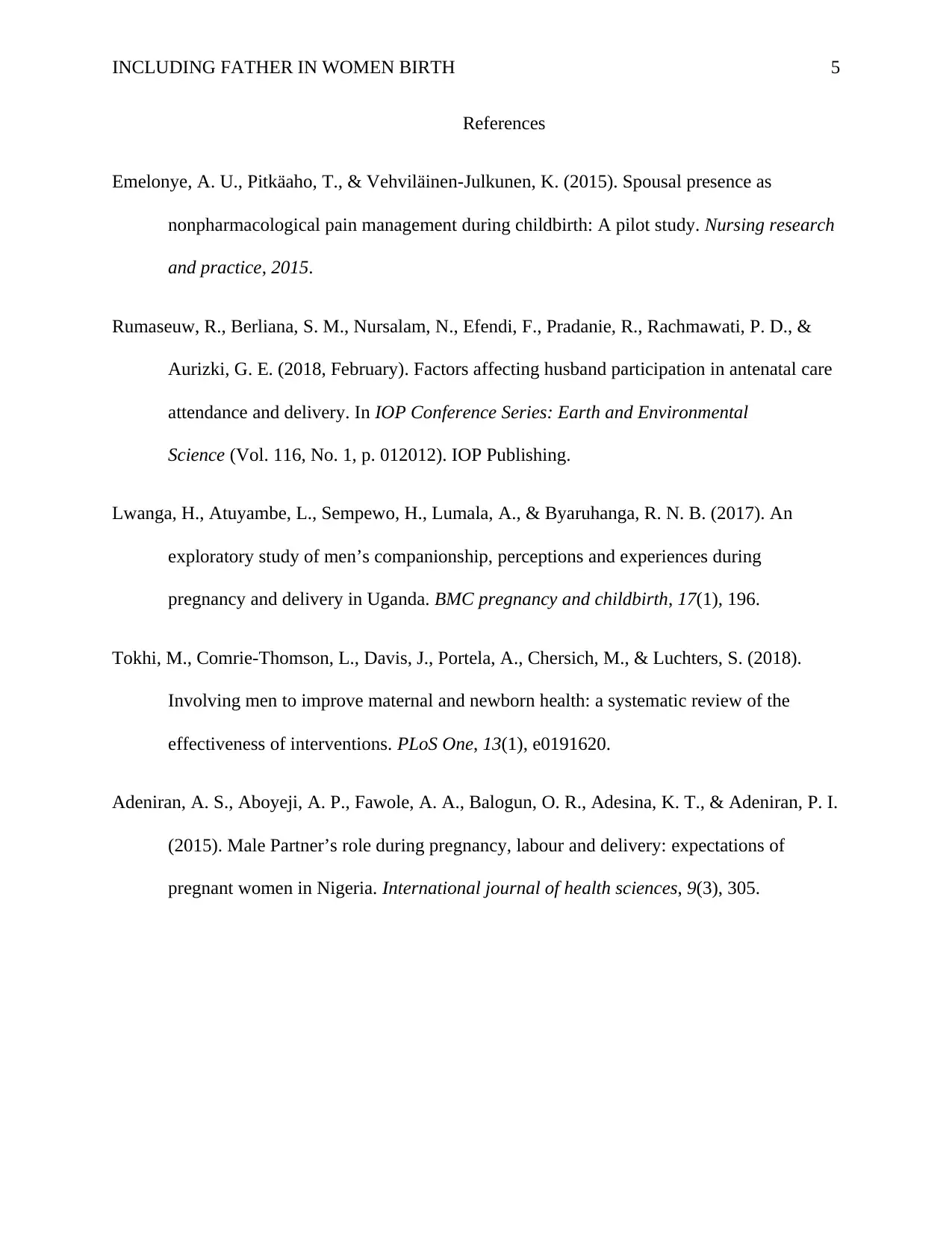
INCLUDING FATHER IN WOMEN BIRTH 5
References
Emelonye, A. U., Pitkäaho, T., & Vehviläinen-Julkunen, K. (2015). Spousal presence as
nonpharmacological pain management during childbirth: A pilot study. Nursing research
and practice, 2015.
Rumaseuw, R., Berliana, S. M., Nursalam, N., Efendi, F., Pradanie, R., Rachmawati, P. D., &
Aurizki, G. E. (2018, February). Factors affecting husband participation in antenatal care
attendance and delivery. In IOP Conference Series: Earth and Environmental
Science (Vol. 116, No. 1, p. 012012). IOP Publishing.
Lwanga, H., Atuyambe, L., Sempewo, H., Lumala, A., & Byaruhanga, R. N. B. (2017). An
exploratory study of men’s companionship, perceptions and experiences during
pregnancy and delivery in Uganda. BMC pregnancy and childbirth, 17(1), 196.
Tokhi, M., Comrie-Thomson, L., Davis, J., Portela, A., Chersich, M., & Luchters, S. (2018).
Involving men to improve maternal and newborn health: a systematic review of the
effectiveness of interventions. PLoS One, 13(1), e0191620.
Adeniran, A. S., Aboyeji, A. P., Fawole, A. A., Balogun, O. R., Adesina, K. T., & Adeniran, P. I.
(2015). Male Partner’s role during pregnancy, labour and delivery: expectations of
pregnant women in Nigeria. International journal of health sciences, 9(3), 305.
References
Emelonye, A. U., Pitkäaho, T., & Vehviläinen-Julkunen, K. (2015). Spousal presence as
nonpharmacological pain management during childbirth: A pilot study. Nursing research
and practice, 2015.
Rumaseuw, R., Berliana, S. M., Nursalam, N., Efendi, F., Pradanie, R., Rachmawati, P. D., &
Aurizki, G. E. (2018, February). Factors affecting husband participation in antenatal care
attendance and delivery. In IOP Conference Series: Earth and Environmental
Science (Vol. 116, No. 1, p. 012012). IOP Publishing.
Lwanga, H., Atuyambe, L., Sempewo, H., Lumala, A., & Byaruhanga, R. N. B. (2017). An
exploratory study of men’s companionship, perceptions and experiences during
pregnancy and delivery in Uganda. BMC pregnancy and childbirth, 17(1), 196.
Tokhi, M., Comrie-Thomson, L., Davis, J., Portela, A., Chersich, M., & Luchters, S. (2018).
Involving men to improve maternal and newborn health: a systematic review of the
effectiveness of interventions. PLoS One, 13(1), e0191620.
Adeniran, A. S., Aboyeji, A. P., Fawole, A. A., Balogun, O. R., Adesina, K. T., & Adeniran, P. I.
(2015). Male Partner’s role during pregnancy, labour and delivery: expectations of
pregnant women in Nigeria. International journal of health sciences, 9(3), 305.
1 out of 5
Related Documents
Your All-in-One AI-Powered Toolkit for Academic Success.
+13062052269
info@desklib.com
Available 24*7 on WhatsApp / Email
![[object Object]](/_next/static/media/star-bottom.7253800d.svg)
Unlock your academic potential
Copyright © 2020–2026 A2Z Services. All Rights Reserved. Developed and managed by ZUCOL.





